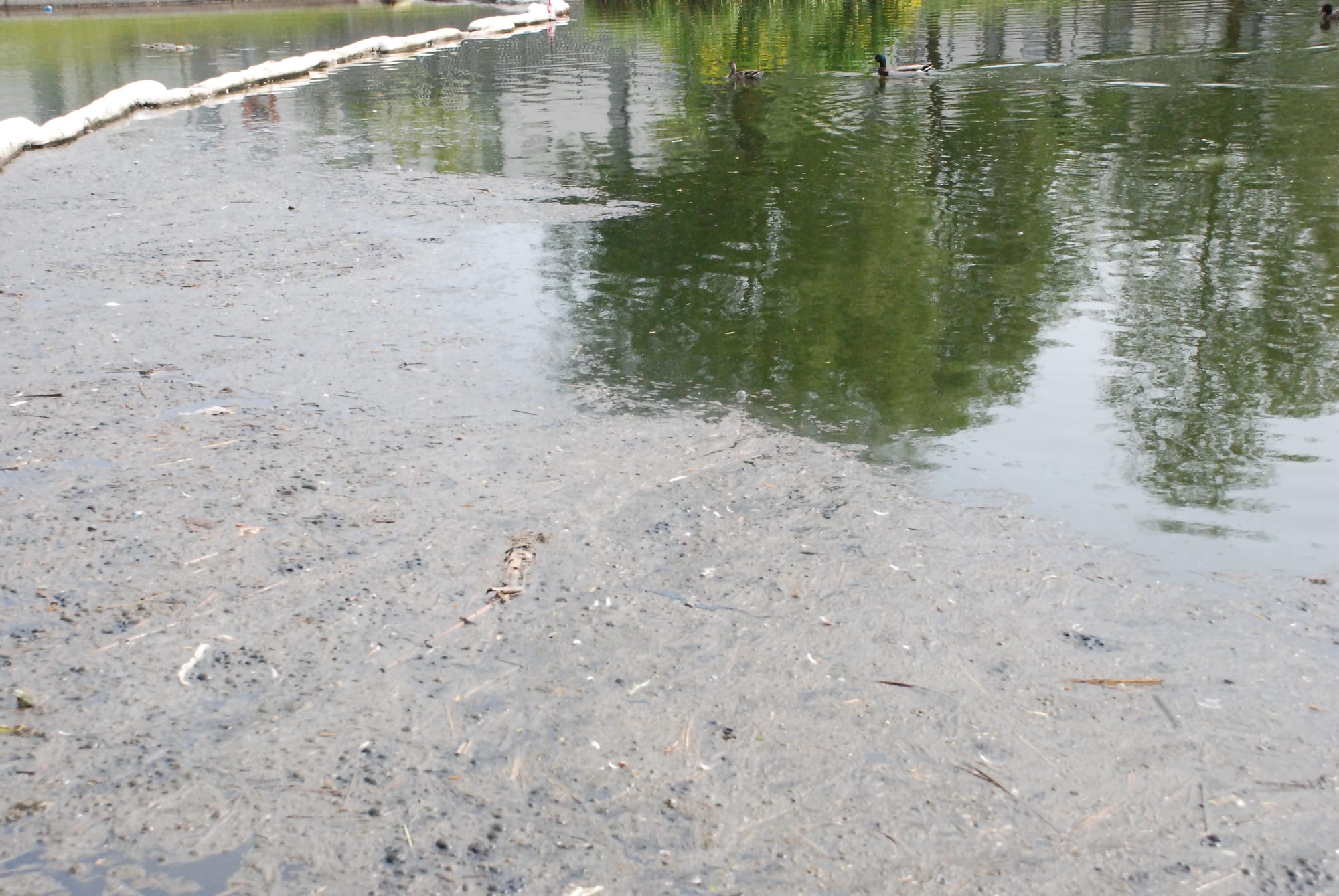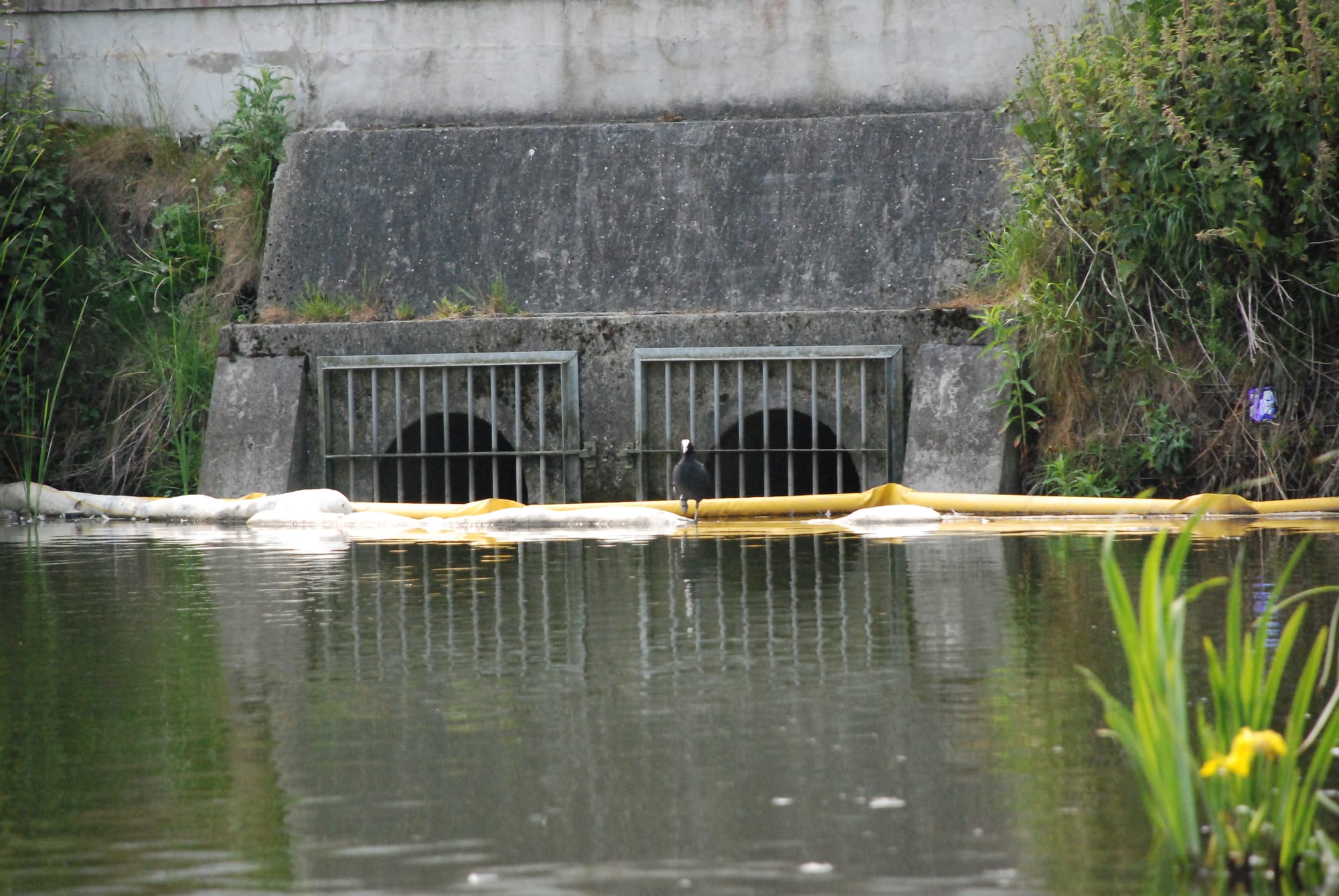What’s the best way to tell area residents about plans for a new asylum shelter nearby?
The government should tell communities directly about plans for new asylum shelters, some activists and politicians say.
Eight times over the last two years, the lake in Poppintree Park in Ballymun has been polluted. Dublin City Council suspects the latest incidence was intentional dumping, not an accident.

When the chemicals came, the swans were run out of town.
Eight times in the last two years, the lake in Poppintree Park in Ballymun has been polluted.
If the swans are ever to stay at ease, whoever’s doing it has to be found, fined, and stopped.
Yet, evading Dublin City Council and contractors alike, the most recent polluter or polluters have yet to even be identified.
Last week, I decided to see if I could help with that. I started with a trip to the lake.
In Poppintree Park, at 7pm on a Thursday, dog walkers make the most of the summer’s later light.
A dozen or so ducks perch on a concrete pontoon at the edge of the lake. The faint buzz of a fly hovers near the water’s edge.
White booms remain spread across the water to prevent any further pollutant entering.
This most recent case has been the worst one yet.
As the fly shoots off, I wonder whether this latest dump of chemicals was the work of the incompetent or the insidious.
On 6 February, a small quantity of waste oil or diesel was discharged into the lake via the surface drainage network.
Before the lake had time to recover from this pollution another batch came thundering through the very same drainage network.
This time, on 6 March, 30 or so litres of liquid spilled out into the pond, killing fish and forcing the swans to abandon their nests.

Potential Suspects
Council officials and contractors believe that the pollutant was poured down a drainage shore, according to Julian Beatty, whose company Nova-Q was contracted to undertake the clean-up.
With metal grates every 30 yards or so along the roads, the potential suspects are legion.
No one in the park this evening has any indication of who the dumper might be. Anne, who didn’t want to give her second name, says she recalls the stench though.
“The smell was the thing, it was horrible,” she said. “It was a kind of chemical smell, I think they reckon someone, somewhere, poured something into a drain.”
Dublin City Council press office said that, “a significant quantity (estimated to be greater than 30 litres) of a combination of waste oils or diesel, solvents and thinners” was discharged into the lake at Poppintree.
So did it come from somewhere local? Thirty or so litres seems like a lot.
The council inspected a small number of premises in the motor and food sectors, but hasn’t found any evidence yet, said the press office.
The particular chemicals themselves, still somewhat present this evening, may allow them to narrow their search.
The lake at Poppintree sits at the Ballymun end of the park, which stretches over 45 acres, serving residents of Glasnevin and Finglas too.
The lake was polluted two times in 2014, four times in 2015, and now two more times in 2016.
The Fats, Oils and Grease (FOG) Inspectorate team were told about the recent pollution, according to a council spokesperson. But they carry out regular inspections, and have yet to raise any particular concerns in this area.
Back in Ballymun, the midday sun is hot and I light another cigarette, hoping for some clue to better track down the most recent culprit.
Is it a mechanic, a chipper, or a local resident? A petrol station or a nearby factory?
The difficulty in placing the perp is the relative size of the water drainage system. The pollutant was not necessarily dumped nearby.
Beatty of Nova-Q thinks the Poppintree polluter may not have been aware of where the fluid would end up.
“All of these rain drains, storm drains, you have on the side of the road, most people assume that those go to sewer,” he says. “The reality is that those never go to sewer, they always go into some kind of a water course.”
People need to know this, he says. If they want to dispose of something, they have to do it responsibly.
The most recent incident in Poppintree was particularly bad. “I’d say from a lake perspective this was the worst I’ve ever seen,” he says. “This is really up there.”
Leaving the park, I stroll around the neighbourhood: down Holywell and onto Belclare Park. The businesses I visit, newsagents, cafes, either have heard nothing or don’t want to know.
Back near the park entrance, I meet Brendan Hunter, who recalls the smell from the lake in recent weeks. He, like other locals I speak with, is adamant it wouldn’t have been a resident dumping 30 litres into the water.
So who was it?

Lighting another cigarette, I call Eoin Hegarty, an environmental officer working in Dublin.
Hegarty says that if the chemical is diesel – the council can’t say for sure – it could simply have been someone who filled their car with the wrong petrol, siphoned it off and dumped it.
Part of the problem, Hegarty says, is that spilled chemicals change over time, so they can be hard to identify. “Its characteristics change, so it comes out looking like something else after a time,” he says.
Before heading back to Poppintree Park one more time, I take a stroll up Jamestown Road, getting off the bus early in the hopes of making a breakthrough.
Again, no luck. The two mechanics I visit don’t want to know. And, if the FOG Inspectorate team and professional contractors can’t find the source of the pollution, it’s unlikely one nosy hack on foot’ll do the job.
At the lake again, the ducks remain perched on their concrete slab. I light up a fag and remember something that Beatty of Nova-Q mentioned.
He was almost certain the recent chemical was paint thinner, not diesel. I called him back to confirm.
It was the smell that tipped him off, he says. “You can imagine how many paint brushes you could clean with 30 litres of paint thinner.”
If the pollutant is indeed paint thinner, that may narrow the field. Yet, dumped down a shore, it could have come from Glasnevin, Finglas, or Ballymun.
Neither the council, nor Beatty, could confirm that it was the same party or parties polluting the lake each time. But the council press office said the dumping might well have been deliberate, rather than accidental.
“There was no evidence of a direct discharge of the product from any commercial or industrial premises to the surface water drainage network, suggesting that the product may have been deliberately discharged”, according to the council press office.
As I leave the lakeside for the final time, I notice more ducks have entered the water. Perhaps the chemicals are finally dispersing.